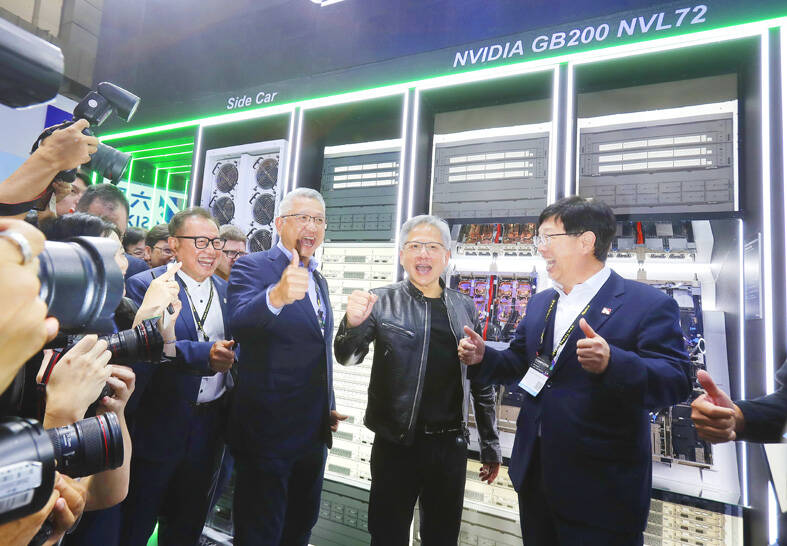Hon Hai Precision Industry Co (鴻海精密) yesterday said artificial intelligence (AI) server revenue this quarter is to more than double from a year ago, driven by demand for AI servers based on Nvidia’s GB200 chip from the world’s major cloud service providers (CSP) and large-scale enterprises.
The growth momentum is expected to extend into the rest of the year, Hon Hai said. This year as a whole, revenue from AI servers would swell to about NT$1 trillion, following an annual growth of 150 percent last year, company chairman Young Liu (劉揚偉) told investors during an online investor conference.
That meant AI server revenue would account for more than 50 percent of the company’s overall server revenue this year, up from 40 percent to 42 percent last year, Liu said.

Photo: Chiang Ying-ying, AP
Servers and networking products would soon become the largest revenue contributor to Hon Hai, replacing smartphones, he said.
“The AI server market is thriving now, thanks to strong demand for GB server racks from the world’s major CSPs and first-tier brand vendors. Those [machines] are adopted particularly for cloud computing and high-performance data centers,” Liu said, citing better order visibility.
Hon Hai is also ramping up production of GB200 servers with an improving yield, Liu said, adding that the growth momentum would be supported by the upcoming production of AI servers equipped with new-generation AI chips, he said.
As a key supplier to Nvidia, Hon Hai aims to seize more than 40 percent of the world’s AI server market, Liu said.
Liu also dismissed rumors about ebbing demand for AI servers from cloud service providers (CSPs).
“There was a rumor saying that CSP demand will peak this year. And then, it will go down after this year. We are not seeing that. We think the demand is still pretty strong,” at least for Hon Hai, Liu said.
Asked about growing competition from servers powered by AI application-specific ICs (ASICs), Liu said: “Most of the training still happens in the cloud side, so most activities on the AI demand is mostly still for AI training.”
Looking at the current quarter, Hon Hai expects revenue to grow significantly on an annual basis, beating the seasonal slowdown the company has seen over the past 5 years, Liu said.
All major product segments are expected to see strong year-on-year growth this quarter, led by servers and networking products, Liu said.
Asked about how to cope with US President Donald Trump’s tariff policy, Liu said Hon Hai is discussing with its customers to build new manufacturing sites in the US.
To fund those new factories, Hon Hai plans to hike its capital expenditures this year by 20 percent from NT$136.3 billion last year. The company said it would discuss with customers to absorb cost increases in order to keep a stable profit margin.
Hon Hai yesterday posted the strongest annual net profit in the company’s history, amounting to NT$152.71 billion, up 7 percent from NT$142.1 billion in 2023. Earnings per share rose to NT$11.01 from NT$10.25, the highest since 2008.
The board of directors yesterday approved a cash dividend distribution of NT$5.8 per common share, the best since the company’s listing in 1991. That represented a payout ratio of 52.7 percent.

SEMICONDUCTORS: The German laser and plasma generator company will expand its local services as its specialized offerings support Taiwan’s semiconductor industries Trumpf SE + Co KG, a global leader in supplying laser technology and plasma generators used in chip production, is expanding its investments in Taiwan in an effort to deeply integrate into the global semiconductor supply chain in the pursuit of growth. The company, headquartered in Ditzingen, Germany, has invested significantly in a newly inaugurated regional technical center for plasma generators in Taoyuan, its latest expansion in Taiwan after being engaged in various industries for more than 25 years. The center, the first of its kind Trumpf built outside Germany, aims to serve customers from Taiwan, Japan, Southeast Asia and South Korea,

Gasoline and diesel prices at domestic fuel stations are to fall NT$0.2 per liter this week, down for a second consecutive week, CPC Corp, Taiwan (台灣中油) and Formosa Petrochemical Corp (台塑石化) announced yesterday. Effective today, gasoline prices at CPC and Formosa stations are to drop to NT$26.4, NT$27.9 and NT$29.9 per liter for 92, 95 and 98-octane unleaded gasoline respectively, the companies said in separate statements. The price of premium diesel is to fall to NT$24.8 per liter at CPC stations and NT$24.6 at Formosa pumps, they said. The price adjustments came even as international crude oil prices rose last week, as traders

SIZE MATTERS: TSMC started phasing out 8-inch wafer production last year, while Samsung is more aggressively retiring 8-inch capacity, TrendForce said Chipmakers are expected to raise prices of 8-inch wafers by up to 20 percent this year on concern over supply constraints as major contract chipmakers Taiwan Semiconductor Manufacturing Co (TSMC, 台積電) and Samsung Electronics Co gradually retire less advanced wafer capacity, TrendForce Corp (集邦科技) said yesterday. It is the first significant across-the-board price hike since a global semiconductor correction in 2023, the Taipei-based market researcher said in a report. Global 8-inch wafer capacity slid 0.3 percent year-on-year last year, although 8-inch wafer prices still hovered at relatively stable levels throughout the year, TrendForce said. The downward trend is expected to continue this year,

Taiwan Semiconductor Manufacturing Co (TSMC, 台積電), which supplies advanced chips to Nvidia Corp and Apple Inc, yesterday reported NT$1.046 trillion (US$33.1 billion) in revenue for last quarter, driven by constantly strong demand for artificial intelligence (AI) chips, falling in the upper end of its forecast. Based on TSMC’s financial guidance, revenue would expand about 22 percent sequentially to the range from US$32.2 billion to US$33.4 billion during the final quarter of 2024, it told investors in October last year. Last year in total, revenue jumped 31.61 percent to NT$3.81 trillion, compared with NT$2.89 trillion generated in the year before, according to